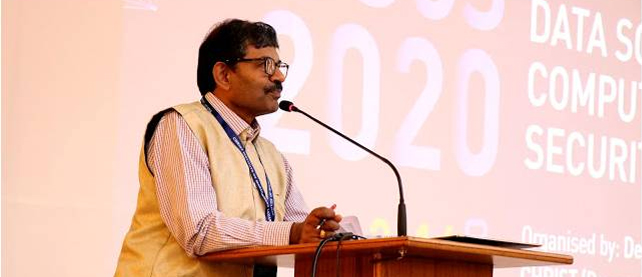Activities
The department of Computer Science of CHRIST (Deemed to be University), Lavasa gives enormous opportunities and training to its students. CHRIST, Lavasahas conducted various workshops and conferences to create more awareness in the field of Data Science.
Data science association(DSA)
Data Science Association (DSA) is an initiative of a group of senior academics and students as well as professionals from CHRIST Lavasa. The objective of this association is to promote our students for participating in various club activities that will help them to build and explore the opportunities in the field of Data Science. It will also promote the awareness and study of data science in schools and higher educational institutions and will create a Data Science Code of Professional Conduct and to promote ethical practices in data science at all levels. With these objectives, the DSA have introduced club activities into 5 different clubs. Each club are distinctive and provide different knowledge in the data science domain.
Department of Data Science, CHRIST (Deemed to be University), Lavasa Campus, inaugurated Computer Society of India (CSI) Student Branch and Data Science Association (DSA) for the academic year 2019-20 on 4th September 2019 at Central Block Auditorium, CHRIST, Lavasa. The Chief Guest for the program was Mr. Kapil Tiwari; Associate Director & Product Development, SS&C Eze Software, Hyderabad, India.
The Chief Guest, MrKapil gave an insightful talk on why Cloud Computing is essential for a Data Scientist. MrKapil Tiwari began the lecture defining cloud computing basics, the process and challenges faced in data science and how cloud computing is used in data science. He also explained basics of cloud computing, development and delivery modules, the typical data science process and framework and tools involved in it. MrKapil rightly pointed out at the outset that cloud is required for platform independency, dynamic scaling and load balancing, collaborative computing and something which can be measured and monitored.
International Conference’20
The Computer Science Department at CHRIST (Deemed to be University), Lavasa recently conducted the International Conference-IDSCS 2020, which served as a technical gathering of Internet and Data security professionals to exchange the latest developments that are gaining momentum in the ever-growing global Infrastructure of Computer Science. All accepted, registered and presented high-quality papers were submitted to Springer “Lecture Notes in Networks and Systems” indexed in ISI Proceedings, SCOPUS, Google Scholar and Springer link for publication.
Dr. Balachandran Krishnan, Head, Department of Computer Science and Engineering at Kengeri Campus and Professor at CHRIST (Deemed to be University), Bangalore was the speaker and he spoke on discussion on various types of learning. He insisted upon finding appropriateness of learning in an environment. Learning involves logical development of pattern in the process of doing the same task.
Projects with clever insights
Christ (Deemed to be University),Lavasa in collaboration with Clever Insight Open AI Foundation has completed the data analytics project for Right to live Foundation. Right to Live, an initiative by Kote Foundation, was started with a mission of helping the less privileged improve their standard of living with access to essential services such as Health, Education, Basic Infrastructure, Clean environment and Digital inclusion. Right to Live, an initiative by Kote Foundation, was started with a mission of helping the less privileged improve their standard of living with access to essential services such as Health, Education, Basic Infrastructure, Clean environment and Digital inclusion.
Team from Christ (Deemed to be University), Lavasa has helped the NGO in analysing the patterns related to donations and has helped them in formulating the plan for its digital marketing to increase the contributions.
Guest Lectures
Guest lecture on Data Visualization Techniques
Department of Computer Science organised a guest lecture on `Data Visualization techniques’ by Mr Bastin Robin, Chief Data Scientist, Clever Insight Inc, Bengaluru on 7th march 2020.
The lecture gave an insight about the importance of data visualization along with a detailed explanation about the importance of data storytelling. It was quite informative and interesting and the students listened in rapt attention. The students were quite fascinated to know how different subjects taught in MSc are interconnected. Then Mr Bastin Robin gave a live demonstration of how crime rate analysis in Pune can find a correlation and how the names and results are interconnected. The students were further interested to know more about the basic tools of data visualization. It caught their attention and they enquired more about them.
Guest Lecture On ‘Multivariate Techniques in Data Science’
A guest lecture was delivered on 6th March 2020 organised by the Computer Science Department. The speaker, Dr C Muthu is Head of the Department of Department of Data Science, Loyola College, Chennai talked about `Multivariate Techniques in Data Science’.
The talk clarified concepts like Data Visualization, always, helps one to understand problems and provides solutions in a better way and thus has a better impact. He practically mentioned that solving real-time problems enhances confidence and gives better knowledge. During the session Dr C Muthu listed out multiple roles of a Data Scientist (DS). According to him, a data scientist needs to find ways to tackle all sorts of problems in the project, such as, recording real-time data and taking into account the historical data, what type of data needs to be collected, checking data set and handle missing values and outliers.
Workshops
Machine Learning
Mr Dhanesh Solanki, Principal Engineer (Architect), Harman Connected Service Corporation Pvt Ltd (Now Samsung), Bangalore conducted a workshop on `Machine Learning in Python’ on Saturday, 8th February 2020 at Smart Room, Central Block. It was organized by Department of Computer Science, CHRIST (Deemed to be University), Lavasa. Director & Dean, Dr Fr Jossy P George and Academic Coordinator, Dr Fr Arun Antony inaugurated the workshop.
Mr Solanki, holds nearly ten years of experience in Data Science and is currently associated with Harman Connected Service Corporation Pvt. Ltd (Now Samsung) as Principal Engineer (Architect) in Automotive Domain "ADAS". He is also a PhD student at Indian Statistical Institute, Bangalore, and his research topic is Hybrid Deep Neural Network. He holds M Tech from BITS, Pilani and B Tech from University of Rajasthan. He holds six patents which deal with multiple ideas selected from MIT Media Lab Boston Lab Under Harman Research of ADAS Domain. He has submitted many research papers and is privileged to be a reviewer for many international journals.
IEEE and Research Methodology
A two-day workshop on Research Methodology and Technical Paper Writing and IEEE Authorship Lab in technical association with IEEE, ComSoc, Bangalore and Computer Society of India for Economics and Data Science students, selected faculty members and research scholars, was conducted on 13th and 14th September 2019 at CHRIST (Deemed to be University), Lavasa, Pune.The resource person was DrNavin Kumar, Fellow IE (India). He is a Senior Member of IEEE, IET(UK), AIENG (HK), Life Member IETE and IEEE, ComSoc, Bangalore Chapter and Global ICT Standardisation Forum for India (GISFI). Currently, he is working as Associate Professor, Amrita School of Engineering, Amrita Vishwa Vidyapeetham, Bangalore.
The main motivation behind the workshop was to improve research quality apart from creating an environment and culture for research in Lavasa campus. The workshop’s objectives from academic perspective, were primarily to ensure that the participants should be able to understand some basic concepts of research and its methodologies, identify appropriate research topics, select and define appropriate research problem and parameters, prepare a project (thesis) proposal (to undertake a project/thesis), organize and conduct research (advanced project) in a more appropriate manner, write a research report, article/paper and thesis, write a research proposal (grants) and review an article and submit the report (peer review process).











